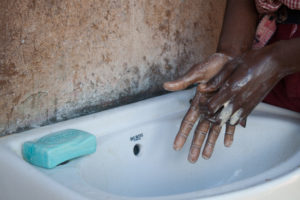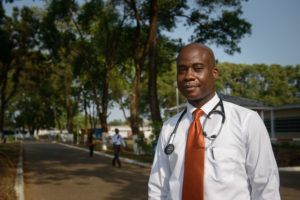COVID-19 is threatening health systems and vulnerable populations around the world. As the world faces the uncertainty of a global pandemic, PSI is on the front lines. We are applying our 50 years of expertise to ensure that the people we serve get access to critical self-care, prevention, and healthcare services during the COVID-19 crisis.
HOW WE’RE RESPONDING TO COVID-19

- Immediate Response: We’re fast-tracking our response by adapting our existing programs to respond to urgent needs created by COVID-19, such as hand washing campaigns and advocacy around social distancing.
- Programming specific to COVID-19: Using our 50 years of expertise, we’re creating and expanding programs that address ongoing needs for COVID-19, such as emergency operations centers and creating digital tools for tracking and diagnosis.
- Operational Impact: We’re working with our in-country offices to integrate COVID-19 activities into their work. We also work to ensure that lifesaving activities that could be compromised due to COVID-19—like malaria prevention, HIV treatment and prevention services and access to contraception—can continue with minimal interruption.
- Future Impact: When lockdown orders are lifted, we know from experience that there will be a huge need for health products and services that weren’t available or accessible during the pandemic. Two years before the pandemic, PSI committed to evolving our health approach and bringing care closer to the consumer, ensuring that we’ll be ready for the coming surge in demand.
OUR COVID-19 SOLUTIONS
Digital Tools:
-
Remote support for health workers: We’ll use our existing digital tools such as e-Learning platforms as a route to provide timely and cost-effective training and support to providers on COVID-19 related matters.
-
Data capture and reporting from private sector channels: PSI’s digital team is developing options to capture data regarding suspected cases of COVID-19 at private sector clinics and pharmacies and will support contact tracing as part of recommendations for self-isolation.
-
Digital landscaping: PSI conducts rapid digital landscape analyses of digital penetration and heterogeneity in access to digital platforms. Based on these analyses, PSI will develop interventions that still safely reach these populations with COVID-19-related health communications, including those most effective in reaching high-risk groups.
Social Behavior Change
-
Community Mobilization: PSI emphasizes community mobilization as a primary Social Behavior Change (SBC) approach to rapidly scale up and disseminate messages around key health behaviors at the community level. PSI identifies community “mobilizers” through our partnerships and connections to local organizations, community health workers, and other influencers. These mobilizers can be trained on the delivery of key messages and can often be reached through mobile (IVR, SMS) or digital (e.g. WhatsApp) channels. Mobilizers can share key messages through their communities in a responsible way – for example, door-to-door (as opposed to community gatherings) where they would also model preventive behaviors (i.e. having conversations in front of homes while modeling 6ft./2m distancing). These approaches were successfully leveraged during the Ebola outbreak.
-
Raising awareness: In order to attract online audiences, PSI is working with in-country teams to develop robust digital marketing strategies utilizing websites, search engine optimization, sponsored ads, social media, social listening, and social media influencers. PSI conducts tests continuously to refine messaging during social media campaigns.
-
Social media monitoring and social listening: Social media tools assist us in the regular and systematic tracking of public opinions related to PSI’s and other implementing partners’ SBC efforts. This supports us in adjusting content to better engage target users.
Government Coordination:
-
Country Level: PSI aligns our work to partner countries’ crisis response plans in many ways. In some cases, PSI expert colleagues are members of national healthcare task forces. PSI’s role is often to provide technical assistance on social behavior change (SBC) and awareness campaigns through multiple channels that include mass and below the line media. PSI also supports governments in conducting real-time surveillance through the DHIS2 platform and through implementation in both the public and private sectors. PSI also works to strengthen governments’ response in supporting Emergency Operations Centers with the training of key personnel, alignment, and coordination of efforts and/or alignment of social behavior change efforts.
-
Global: PSI sits on five different advisory groups at the WHO, which directly inform global policy and guidelines to WHO member countries. PSI is also a respected participant of many other global forums where we can influence policy and direction such as within other UN bodies, The Global Fund and the World Bank.
Self-Care:
-
Manage risks: PSI supports the scaling of digital tools to help consumers assess their individual risk, self-manage potential exposure and/or symptoms, find nearby testing sites, and access alerts from public health authorities.
-
Mass media: Our mass media channel strategy is based on utilizing the best channels to reach the priority target audience segments identified in each country. Through formative research PSI discerns which channels consumers prefer to receive critical self-care information. We then design a media strategy that leverages diverse channels aligned around simple messages. The media mix could leverage local radio and TV channels to air educational spots and public service announcements.
Methodologies for Rapid Response
-
Surveillance: PSI strengthens national surveillance tools by increasing capacity of ministries of health for improved and timely surveillance of COVID-19 using DHIS2, the world’s largest health management information system (HMIS) in use in 67 low- and middle-income countries, to accelerate case detection, situation reporting, active surveillance and response for COVID-19.
To learn more please click here.






